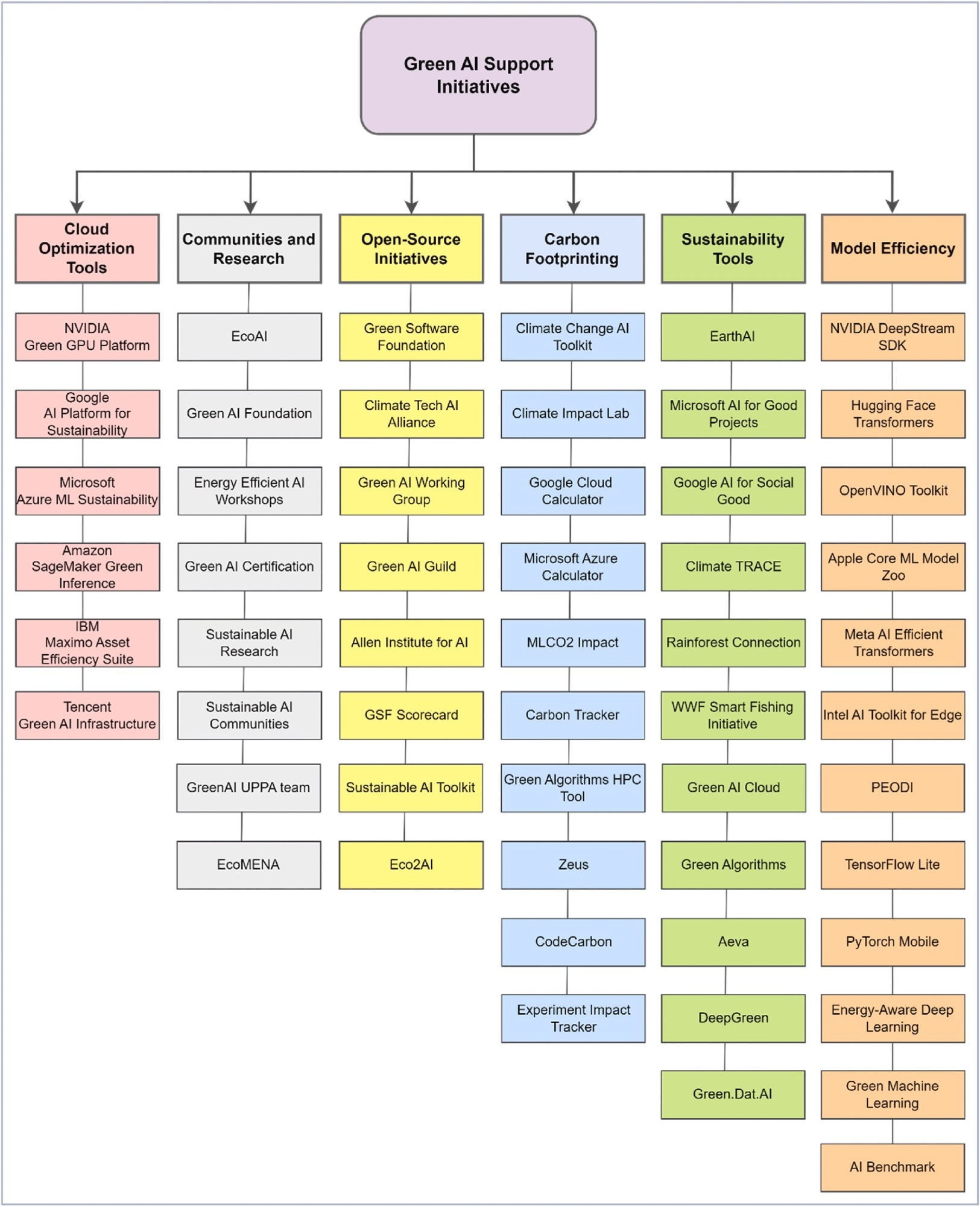Environmental Impact of AI Technology
AI holds enormous potential to revolutionize industries such as banking, healthcare, and the automotive sector. In 2023, global spending on AI technology reached $154 billion, with significant investments from the banking and retail sectors. However, AI, especially large generative AI models, poses substantial environmental challenges due to their intensive energy consumption.
Generative AI models, like the generative pre-trained transformer (GPT), require extremely high amounts of energy for training and operation, contributing to a large carbon footprint. For example, training GPT-3 alone consumed 1,287 MWh of electricity, equivalent to the annual emissions of 123 gasoline-powered cars. This starkly underscores concerns about AI’s sustainability and the need for green AI initiatives to reduce energy usage and promote environmental sustainability.
Green AI Initiatives and Their Importance
The paper identified and categorized a total of 55 green AI initiatives into six themes, including cloud optimization, model efficiency, carbon footprinting, sustainability-focused AI development, open-source initiatives, and green AI research and community.
 Summary of green AI initiatives.
Summary of green AI initiatives.
These initiatives aimed to reduce AI's environmental impact by optimizing computational infrastructure, improving model efficiency, and encouraging renewable energy use. The authors emphasized the importance of collaboration and open-source initiatives in advancing green AI and underscored critical ethical considerations for responsible AI development.
Comprehensive Review of Green AI Tools
This study reviewed existing literature, corporate reports, professional websites, and expert blogs to analyze and evaluate existing green AI initiatives. They discussed each initiative's strengths and limitations, offering a detailed overview. For example, cloud optimization tools aim to reduce power consumption through enhanced infrastructure and workload deployment optimization. Model efficiency tools focus on reducing AI models' computational demands, while carbon footprinting tools help assess and minimize AI systems' carbon emissions.
Sustainability-focused AI initiatives promote AI solutions that contribute to broader environmental goals, and open-source initiatives encourage collaboration and resource sharing in green AI development. In contrast, green AI research communities aim to foster collaboration and address challenges related to sustainable AI development while promoting best practices across industries.
Key Findings and Insights
The outcomes highlighted the potential of green AI initiatives to significantly reduce AI's environmental impact. For example, cloud optimization tools like NVIDIA’s Green graphical processing unit (GPU) Platform, Google’s AI Platform for Sustainability, and Microsoft’s Azure ML Sustainability could save substantial energy and reduce carbon footprints. However, implementing these tools may require specialized expertise and face hardware compatibility issues.
Model efficiency tools such as the NVIDIA DeepStream SDK, Hugging Face Transformers, and OpenVINO Toolkit improved AI performance while lowering energy use but may involve difficult trade-offs in accuracy. The researchers also underscored the importance of ethical standards in green AI development, ensuring that AI technologies must be developed and deployed responsibly.
Practical Applications and Industry Implications
This study has important implications for industries, especially those focused on sustainable AI and technology. The identified initiatives provide practical ways to reduce AI's environmental impact, making them useful in sectors like manufacturing, healthcare, and finance.
Organizations can lower energy use and carbon emissions by adopting green AI practices and supporting global sustainability efforts. For instance, cloud optimization tools can help companies improve AI infrastructure, yielding significant energy savings.
Model efficiency tools can also enhance AI performance on edge devices, reducing reliance on energy-intensive data centers. Additionally, carbon footprinting tools offer insights into AI's environmental impact, helping companies adopt more sustainable practices. In conclusion, embracing green AI initiatives can lead to more sustainable and environmentally responsible AI applications across various industries.
Conclusion and Future Directions
The review summarized that while significant progress has been made in green AI initiatives, many tools are still in their early stages, requiring more research and analysis. The findings underscored the importance of continued efforts to advance sustainability in AI development.
Future work should focus on refining green AI tools, exploring more scalable methods to reduce energy use, and promoting collaboration among industry stakeholders. Tackling these obstacles would help guide the AI industry toward a more sustainable and environmentally friendly future.